Читати книгу - "Три сили. Як виховують в успішних спільнотах"
Шрифт:
Інтервал:
Добавити в закладку:
447 “Arundhati Roy in Conversation with Venu Govindu”, October 29, 2000, Friends of River Narmada, http://www.narmada.org/articles/arinterview.html. Див. також Ramesh Bairy, Being Brahmin, Being Modern: Exploring the Lives of Caste Today (Routledge: New Delhi, 2010), pp. 85–6. (Хоча брахмани становлять лише 4,28% населення штату Карнатака, вони «як і раніше, надмірно представлені на адміністративних посадах, у вищій освіті, праві», а також медицині та інженерній справі).
448 Constituion of India (1949), art. 15, 17.
449 Bairy, Being Brahmin, pp. 87, 277–81; Error! Main Document Only. Jadhav, Untouchables, p. 3; Louis Dumont, Homo Hierarchicus: The Caste System and its Implications (Chicago & London: University of Chicago Press, 1980), pp. 79–80.
450 Mark Magnier, “In India, Bengalis Seek to Recapture Their Glory as Intellectuals”, Los Angeles Times, September 8, 2012.
451 “Amartya Sen”, Indians Abroad, indobase.com, http://www.indobase.com/indians-abroad/amartya-sen.html; Reshmi R. Dasgupta, “I Had No Idea a Pulitzer Was So Prestigious, Says Pulitzer Prize winner Siddhartha Mukerjee’s Father”, The Economic Times (India), April 22, 2011; див. також Maxine P. Fisher, The Indians of New York City: A Study of Immigrants From India (New Delhi: Heritage Publishers, 1980), p. 49 (зазначено, що бенгальські імена із закінченням «джі», як-от «Мукерджі» чи «Банерджі», належать до «брахманських»).
452 Pawan Dhingra, Life Behind the Lobby: Indian American Motel Owners and the American Dream (Stanford: Stanford University Press, 2012), pp. 4–5, 14; Marjorie Howard, “A Motel of One’s Own”, Tufts Now, November 27, 2012; Nimish Shukla, “16 Gujaratis in Forbes List”, The Times of India, March 8, 2008.
453 “Bhai is king: Gujaratis are ruling Forbes 40 richest Indians list”, Nov. 14, 2008, DeshGujarat.com, http://deshgujarat.com/2008/11/14/bhai-is-king-gujaratisare-ruling-forbes-40-richest-indians-list.
454 Pew Research Center, “How Many U.S. Sikhs?”, August 6, 2012, http://www.pewresearch.org/2012/08/06/ask-the-expert-how-many-us-sikhs/.
455 VedMehta, Rajiv Ghandi and Rama’s Kingdom (New Haven and London: Yale University Press, 1994); див. Dawinder S. Sidhu and Neha Singh Gohil, Civil Rights in Wartime: The Post 9/11 Sikh Experience (Ashgate, 2009), p. 51 (цитата Прабджота Сингха) (опис тюрбана сикхів як «свідчення місії, покладеної на всіх сикхів: поводитися велично, даючи відсіч тиранії і захищаючи гноблених»); D.H. Butani, The Third Sikh War? Towards or Away from Khalistan? (Promilla & Company, 1986), p. 26.
456 Див.Dumont, Homo Hierarchicus, pp. 111–2; Dirks, Castes of Mind, pp. 140–3; Fisher, The Indians of New York City, pp. 29–34; Rayaprol, Negotiating Identities, p. 75; Chetan Bhagat, 2 States: The Story of My Marriage (Rupa & Co, 2009), pp. 13–4, 51; Steve Sailer, “Why are South Indians so Smart?”, Mar. 23, 2002, http://isteve.blogspot.com/2002/03/why-are-south-indians-so-smart.html.
457 Див. Anita Raghavan, The Billionaire’s Apprentice: The Rise of the Indian-American Elite and the Fall of the Galleon Hedge Fund (New York and Boston: Business Plus, 2013), pp. 40–1; Thomas L. Friedman, The World is Flat 3.0: A Brief History of the Twenty-First Century (New York: Picador, 2007), p. 127; Matthew Schneeberger, “Why IIT grads abroad are returning to India”, Redi. India Abroad, May 15, 2008, http://www.redi. .com/money/2008/may/15iit.htm(між 1965 і 2002 роками 35% випускників індійських технологічних інститутів емігрували до Америки і 16% пізніше).
458 Bairy, Being Brahmin, p. 124; див. також Rothermund, India, p. 164 (зазначено, що до початку ХХ століття «буддизм та джайнізм були соціальними та релігійними рухами», що «кидали виклик устрою, побудованому на кастовості та ендогамії»).
459 Див., наприклад, Chua, Day of Empire, pp. 224–28; Niall Ferguson, Empire: How Britain Made the Modern World (London: Allen Lane, 2003), pp. 146–54, 210–15, 325–8.
460 Dutta & Robinson, Rabindranath Tagore, p. 217.
461 Benjamin Anastas, “Inspiring Adaptation”, Men’s Vogue, March/April 2007, p. 113; див. Julia Leyda, “An Interview with Jhumpa Lahiri”, Contemporary Women’s Writing 5, no. 1 (2011), p. 66.
462 Purkayastha, Negotiating Ethnicity, p. 39.
463 Rosalind S. Chou & Joe R. Feagin,The Myth of the Model Minority: Asian Americans Facing Racism (Boulder & London: Paradigm Publishers, 2008), p. 70.
464 Dawinder S. Sidhu and Neha Singh Gohil, Civil Rights in Wartime: The Post 9/11 Sikh Experience (Surrey, England: Ashgate, 2009), pp. xiii-xv, 48, 64–8.
465 Prashad, Uncle Swami, pp. 4–5.
466 Sidhu and Gohil, Civil Rights in Wartime, p. 65; Palash Ghosh, “South Asian Taxi Drivers: Victims and Perpetrators of Racism”, International Business Times, June 22, 2012, http://www.ibtimes.com/south-asian-taxi-drivers-victims-perpetrators-racism-705690.
467 United States v. Thind, 261 U.S. 204, 210, 214–6 (1923).
468 VijayPrashad, Uncle Swami, pp. 3–7; Purkayastha, Negotiating Ethnicity, pp. 27– 31, 38–41.
469 Dhingra, Life Behind the Lobby, pp. 126–9.
470 Raghavan, The Billionaire’s Apprentice, pp. 40–2, 46.
471 Ibid., pp. 11, 13.
472 Ibid., pp. 78, 82–4.
473 Ibid., p. 123.
474 Purkayastha, Negotiating Ehnicity, p. 93; див. також Maira, Desis in the House, p. 72 («упередження індійських іммігрантів проти темношкірих посилюються через американський чорно-білий расовий розподіл»); Vijay Prashad, The Karma of Brown Folk (Minneapolis and London: Univrsity of Minnesota Press, 2000), pp. 157, 178–9 (твердження про те, що багато хто з індійських іммігрантів приймає спрямований проти темношкірих расизм як одну з передумов для зміцнення власних позицій у новій країні), 97–8 (зазначено расистські настрої, що превалюють в Індії); див. також Mahalingam, Philip, and Balan, “Cultural Psychology and Marginality”, pp. 160–62.
475 Purkayastha, Negotiating Ethnicities, p. 93.
476 Maira, Desis in the House, pp. 71–2.
477 Див. Prashad, Uncle Swami, p. 13.
478 Див., наприклад, Purkayastha, Negotiating Ethnicity, p. 33–4.
479
Увага!
Сайт зберігає кукі вашого браузера. Ви зможете в будь-який момент зробити закладку та продовжити читання книги «Три сили. Як виховують в успішних спільнотах», після закриття браузера.

